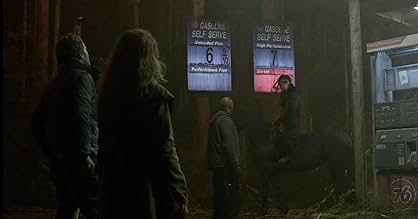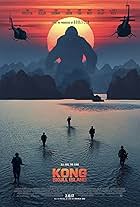The fragile peace between apes and humans is threatened as mistrust and betrayal threaten to plunge both tribes into a war for dominance over the Earth.The fragile peace between apes and humans is threatened as mistrust and betrayal threaten to plunge both tribes into a war for dominance over the Earth.The fragile peace between apes and humans is threatened as mistrust and betrayal threaten to plunge both tribes into a war for dominance over the Earth.
- Nominated for 1 Oscar
- 17 wins & 48 nominations total
Larramie Doc Shaw
- Ash
- (as Doc Shaw)
Storyline
Did you know
- TriviaThe film takes place in 2026.
- GoofsWhen the hydro electricity supply is turned on, the humans say they can now contact other humans on the radios, yet they already had electricity supplied by diesel-powered generators.
- Crazy creditsAfter the credits there is an audio cue of Apes digging through, and removing rubble and concrete. Then Koba's distinctive breathing is heard, hinting at Koba surviving the fall after his struggle with Caesar.
- ConnectionsFeatured in Film '72: Episode dated 5 March 2014 (2014)
- SoundtracksThe Weight
Written by Robbie Robertson
Performed by The Band
Courtesy of Capitol Records, LLC
Under license from Universal Music Enterprises
Featured review
9.5
Sequels often carry the heavy burden of expectations, and few films manage to meet these expectations, let alone surpass them. However, "Dawn of the Planet of the Apes" not only meets the criteria of a great sequel but exceeds them in remarkable ways. This cinematic gem, directed by Matt Reeves, expertly continues the story set in motion by its predecessor, "Rise of the Planet of the Apes." What sets "Dawn" apart is its intelligent storytelling, superb character development, and breathtaking visual effects, which collectively elevate it to the ranks of cinematic excellence.
One of the most commendable aspects of "Dawn" is its strategic decision to shift the focus primarily onto the apes. While the human characters in "Rise" were not inherently flawed, they felt somewhat generic, lacking the depth and nuance needed to fully engage the audience. "Dawn" rectifies this flaw by wisely sidelining most of the human characters from "Rise" and bringing the apes to the forefront. This shift not only provides a fresh perspective but also allows for a more profound exploration of the ape society, their emotions, and their struggles.
What truly distinguishes "Dawn of the Planet of the Apes" is its thematic depth. The film seamlessly weaves together complex themes, including survival, leadership, prejudice, and the consequences of human actions on the environment. These themes are not merely brushed upon but are deeply embedded in the narrative, prompting viewers to reflect on the intricacies of human nature and the choices we make as a species. The movie's ability to tackle such weighty themes with finesse is a testament to the skillful craftsmanship of the filmmakers.
Furthermore, the film boasts some of the most impressive visual effects ever witnessed on the big screen. The seamless integration of motion capture technology to bring the apes to life is nothing short of astonishing. Every nuance of emotion, every subtle facial expression is captured with remarkable accuracy, making the audience forget that they are watching CGI creations and instead, empathize deeply with the characters. In particular, the performances of Andy Serkis as Caesar and Toby Kebbell as Koba are nothing short of masterful. Their ability to infuse these digital creations with genuine emotions and humanity is a testament to their acting prowess.
The brilliance of "Dawn of the Planet of the Apes" is not confined to its individual success alone but extends to its impact on the franchise as a whole. The film, along with its subsequent sequel, "War for the Planet of the Apes," revitalized the franchise, breathing new life into a classic series. This resurgence catapulted the "Planet of the Apes" franchise into my personal top 10 list of all time. In conclusion, "Dawn of the Planet of the Apes" stands as a shining example of what a sequel should aspire to be. It delves deep into its characters, explores profound themes, and dazzles the audience with its visual splendor. This film is a testament to the power of storytelling and the limitless possibilities of cinema, leaving an indelible mark on the hearts and minds of viewers, myself included.
One of the most commendable aspects of "Dawn" is its strategic decision to shift the focus primarily onto the apes. While the human characters in "Rise" were not inherently flawed, they felt somewhat generic, lacking the depth and nuance needed to fully engage the audience. "Dawn" rectifies this flaw by wisely sidelining most of the human characters from "Rise" and bringing the apes to the forefront. This shift not only provides a fresh perspective but also allows for a more profound exploration of the ape society, their emotions, and their struggles.
What truly distinguishes "Dawn of the Planet of the Apes" is its thematic depth. The film seamlessly weaves together complex themes, including survival, leadership, prejudice, and the consequences of human actions on the environment. These themes are not merely brushed upon but are deeply embedded in the narrative, prompting viewers to reflect on the intricacies of human nature and the choices we make as a species. The movie's ability to tackle such weighty themes with finesse is a testament to the skillful craftsmanship of the filmmakers.
Furthermore, the film boasts some of the most impressive visual effects ever witnessed on the big screen. The seamless integration of motion capture technology to bring the apes to life is nothing short of astonishing. Every nuance of emotion, every subtle facial expression is captured with remarkable accuracy, making the audience forget that they are watching CGI creations and instead, empathize deeply with the characters. In particular, the performances of Andy Serkis as Caesar and Toby Kebbell as Koba are nothing short of masterful. Their ability to infuse these digital creations with genuine emotions and humanity is a testament to their acting prowess.
The brilliance of "Dawn of the Planet of the Apes" is not confined to its individual success alone but extends to its impact on the franchise as a whole. The film, along with its subsequent sequel, "War for the Planet of the Apes," revitalized the franchise, breathing new life into a classic series. This resurgence catapulted the "Planet of the Apes" franchise into my personal top 10 list of all time. In conclusion, "Dawn of the Planet of the Apes" stands as a shining example of what a sequel should aspire to be. It delves deep into its characters, explores profound themes, and dazzles the audience with its visual splendor. This film is a testament to the power of storytelling and the limitless possibilities of cinema, leaving an indelible mark on the hearts and minds of viewers, myself included.
Details
- Release date
- Countries of origin
- Languages
- Also known as
- El planeta de los simios: confrontación
- Filming locations
- Production companies
- See more company credits at IMDbPro
Box office
- Budget
- $170,000,000 (estimated)
- Gross US & Canada
- $208,545,589
- Opening weekend US & Canada
- $72,611,427
- Jul 13, 2014
- Gross worldwide
- $710,644,566
- Runtime2 hours 10 minutes
- Color
- Sound mix
- Aspect ratio
- 1.85 : 1
Contribute to this page
Suggest an edit or add missing content







































